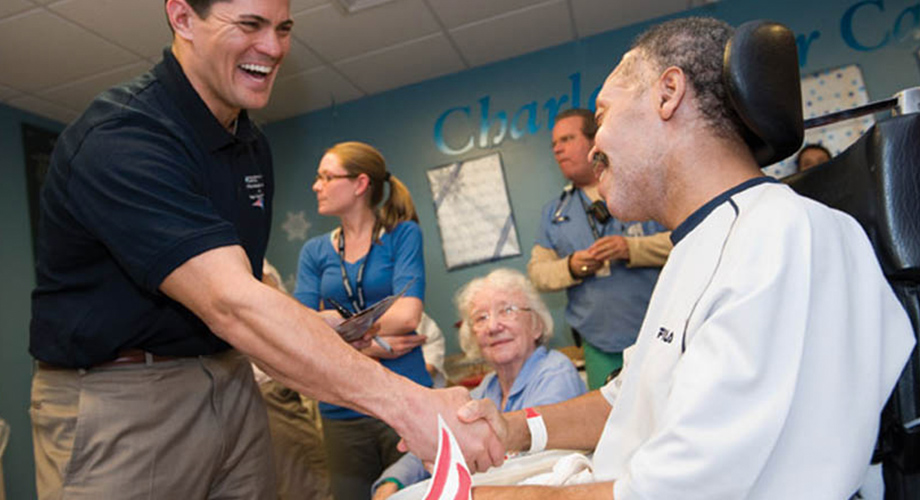Header Skipped.
Stroke Rehabilitation Program at Spaulding Sandwich
Our Stroke Rehabilitation Program offers anyone needing stroke recovery the latest in recovery research and advanced technology. We’re here to help you gain as much of your functionality – and your life – back as possible.
By addressing every aspect of stroke recovery, our therapies and treatments work to improve range of motion, walking, cognitive function, such as speech and learning, and essential life skills including bathing and dressing.
Spaulding’s Approach to Stroke Therapy
795,000 people in the United States suffer from a stroke each year. But only one of them is you. Your goals, your aspirations, your independence are at the center of our treatment plan. We strive to work with you and your family to identify barriers and develop recovery strategies that combine our therapeutic expertise with your needs, your well being and your cognitive, emotional and physical recovery plan.
Hospital Stroke Rehabilitation Programs
Our inpatient, Hospital Rehab teams create an individualized rehabilitation plan to address your medical, physical, speech and swallowing, cognitive, behavioral and psychological effects associated with your stroke.
As part of your rehabilitation, you will have access to:
- Rehabilitation physician-led teams, including physical, occupational, speech, respiratory, recreational, and music therapists, case managers, mental health and internal medicine specialists and nurses with specialized training in neuro-rehabilitation
- In-depth evaluation of functional abilities, including movement patterns, strength, flexibility, language, cognition, and swallowing.
- Proven therapeutic interventions, including exercises, splinting, bracing, compensatory techniques, gait training, neurological re-education of movement and tasks
- Goal setting to foster optimal independence at home and in the community
- Advanced technologies*, including the Armeo and Amadeo arm trainers, the Lokomat robotic gait trainer, the Bioness and NeuroMove Electrical Stimulation Devices, and VitalStim
- Goal setting to foster greater independence at home and in the community
- Counseling to help you adjust to change and plan for the future
- Training to teach family members how to assist with specific therapeutic activities during hospital treatment and after you go home
*Programs vary by location.
Long-term Acute Care Stroke Rehabilitation Programs
Long-term Acute Care (LTAC) hospitals are for people whose stroke is severe or combined with other serious medical problems. Oftentimes, patients in need of LTAC-level care have complex medical and rehabilitation needs and are transferred directly from an acute hospital intensive-care unit (ICU) to our facility.
As part of our LTAC programs, patients receive:
- More intensive medical services than a nursing home and patients generally stay for a longer period of time.
- A wide range of medical services as specialized physicians, nurses, and other clinicians work together to provide specific medical treatments.
- Specialty nursing services including: wound care, telemetry, dialysis, chemotherapy, and rehabilitation therapy.
- Rehabilitation services provided as needed by physical therapists, occupational therapists, speech language pathologists, therapeutic recreation specialists, music therapists.
Skilled Nursing Stroke Rehabilitation Programs
Skilled Nursing Facilities (SNFs) are for people whose stroke may be less severe or have improved enough medically to no longer need hospital level care. Our SNF program is right for people who require long-term skilled nursing services or short-term rehabilitation care including physical, occupational and speech therapy combined with medical oversight.
Outpatient Stroke Rehabilitation Programs
Outpatient rehabilitative care is for people who have had a mild stroke and do not need inpatient rehabilitation care. It is also appropriate for someone who has progressed from inpatient hospital rehabilitation or skilled nursing and returned home, but still needs help regaining complete functional independence, returning to work or re-engaging in a sport or physical activity.
Outpatient services include:
- Physical, occupational and speech therapy
- Physical medicine and rehabilitation
- Specialty services including assistive technologies, audiology, driver assessment, orthotics, vestibular rehabilitation, vision rehabilitation, wheelchair clinics and more*
- Adaptive Sports and Recreation Program
- Aphasia and Stroke Survivor Support Groups
- Aquatic therapy
*Programs vary by location.
Rehabilitation Support
- Stroke Support Group (Monthly)
- Stroke Support Group (Bi-monthly)
- Stroke Peer Visitor Group
- Brain Music Workshop
- Wellness for Stroke Survivors
- Stroke Survivor Book Club
- Spaulding Stroke Survivor Facebook Group
Stories of Strength
View more Patient Stories

